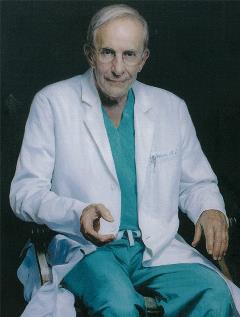News
In Memoriam: George Melville Williams, MD
Aug 31, 2020, 17:21 PM
by
Jen Taylor
The American Society of Transplant Surgeons (ASTS) is deeply saddened by the passing of founding ASTS member and former ASTS president George Melville (Mel) Williams, MD, on August 27, 2020. He was 89.

This year, Dr. Williams was awarded the ASTS Pioneer Award – our Society’s highest honor. He was also previously interviewed for the Chimera Chronicles. You can watch his interview here.
Dr. Williams was born in Soochow (now Suzhow) China in 1930 and lived on the Soochow University campus, where his father led the Department of Sociology. After the Japanese invasion in 1937, the Williamses and portions of the University moved to the French-controlled portions of Shanghai, which included the well-known Shanghai American School. In 1940, the family returned to the U.S.
Dr. Williams graduated from Oberlin College before attending Harvard Medical School and completing an internship in surgery at Massachusetts General Hospital (MGH). His interest in immunity prompted his selection of transplantation as a surgical calling. Following completion of his residency and service in the Army in Tehran, he joined the Medical College of Virginia as Director of Surgical Research, being appointed by Dr. David Hume. A mentee of both Dr. Hume and F. Macfarlane Burnet, Dr. Williams was also the first person to elucidate the pathophysiology of hyperacute rejection as being caused by pre-formed donor specific antibody.
In 1969, Dr. Williams joined Johns Hopkins to initiate a transplantation program and became Chief of Transplantation and Vascular Surgery there. He also held multiple leadership positions in medical societies. He served as the president of the South-Eastern Organ Procurement Foundation (SEOPF) and as the 9th president of ASTS. His ASTS presidential address, in which he highlighted the issue of organ wastage and advocated for broader organ sharing, provided the impetus for the creation of the United Network for Organ Sharing (UNOS) and the Organ Procurement Transplantation Network (OPTN). Fittingly, Dr. Williams served as the first president as UNOS.
Dr. Williams retired from clinical transplant duties at age 70 and vascular surgery five years later. After retiring from active clinical practice, he continued with interest in surgical research and teaching both surgical residents and young faculty.
Dr. Williams is survived by Linda, his wife of nearly 25 years; four children, Curtis, Steve, Lucy, and Elizabeth; two stepchildren, Kristin and Amy; and 12 grandchildren. Dr. Williams is also survived by Lee, his first wife and mother of their children.
In lieu of flowers, contributions can be made in memory of Dr. Williams to support the transplantation research of Dr. Zhaoli Sun, MD. Please make donations payable to Johns Hopkins University and forward to: Fund for Johns Hopkins Medicine (attn. Samantha Oliphant), 550 North Broadway, Suite 722, Baltimore, MD 21205.